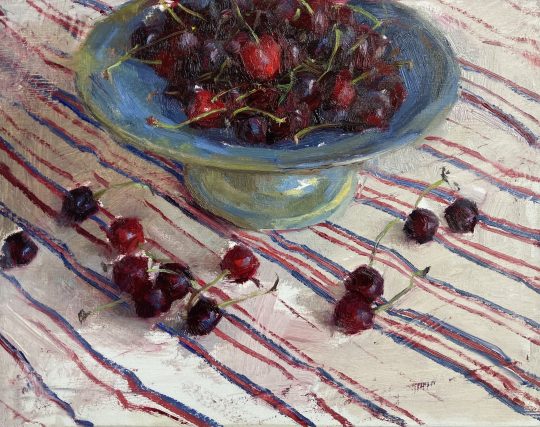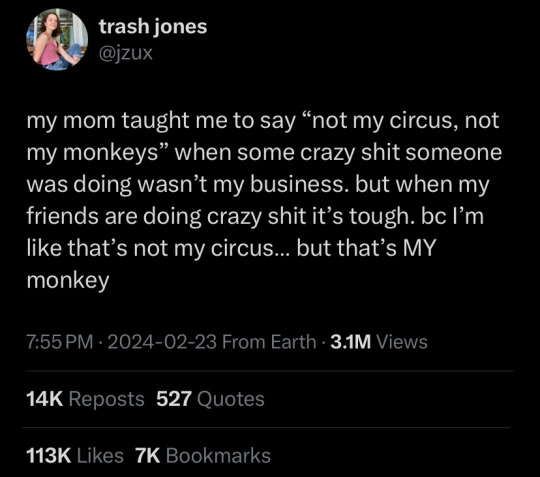Text
And in the one space I allowed myself to wallow and feel bad for myself, M said she would always rather know and I couldn’t disagree more. Knowing has always made it worse. It is what it is now, a black bar crossing it out, a space and then keep moving.
0 notes
Text
I think I have drilled down today’s emotional state too:
the feeling that has settled into my chest and hollowed it out a bit was an old friend, very old very intimate, that I thought, optimistically, I was never going to see again. It is a familiar feeling. Familiar with me and to me. And depressing how I have changed (and I have, I must have) and it still settles down into all of my new corners and edges. I was in my car when I figured it out, and spent the rest of the day feeling a little shocked (I truly never thought I would feel this again) and upset I was shocked, because I had convinced myself I was past this, this was over, which was, clearly, foolish.
I told a friend that time has relentlessly beaten all of my optimism out of me, and that must have been a summoning spell because here we are.
A month ago, someone at work said they admired that I seemed like I trusted myself and my judgment so strongly, “like you know where you stand with everything” and I laughed and I laughed and I laughed and I laughed and I laughed.
0 notes
Text
There is no masculine or feminine urges, there is just the urge to ride the train to Chicago on a Tuesday night
915 notes
·
View notes
Text

Sour Cherries - Anna-Maria Vargiu, 2020.
Dutch , b. 1992 -
oil on MDF panel
465 notes
·
View notes
Text
anyway i looked up the post about seeing your grandma's boobs and tumblr has deleted the screenshot of the story where the finnish dude says that americans are "like that" because they haven't seen their grandma's tits
good job tumblr 👍
82K notes
·
View notes
Text
"goddess" "matriarchy" "female wisdom" girl your civic rights
50K notes
·
View notes
Text
ArteEast has an online program--Archives of Power--screening several Palestinian films for free from March 7-17 !
Archives, often perceived as impartial guardians of history, are actually deeply entwined with political agendas. In the context of the Palestinian struggle, archives have been systematically pillaged and obliterated by the Israeli state and military, resulting in the loss of invaluable records of Palestinian history and resistance. Among the missing archives are decades of footage by the Palestine Liberation Organization’s (PLO) Palestine Film Unit (PFU). This collective of militant filmmakers emerged in the late 1960s, utilizing the camera as a tool of resistance to document the Palestinian experience and the struggle for liberation.
The film program features documentaries about the Palestinian film archive and filmic legacy – Azza El-Hassan’s Kings and Extras: Digging for a Palestinian Image (2004), Mohanad Yaqubi’s Off Frame (aka Revolution Until Victory) (2016)– as well as a selection of earlier films created during the revolutionary Palestinian film era, which have recently been restored as part of El-Hassan’s invaluable initiative, The Void Project, which was founded in 2018 to explore the presence and absence of the Palestinian visual archives as a discourse in narrative formation, and to restore and distribute some of the surviving films of the era.
Archives of Power ultimately strives to amplify the voices and stories that have been marginalized and suppressed, reclaiming agency and autonomy in defiance of ongoing attempts to erase Palestinian history and visual narrative. This program serves as an indispensable platform for comprehending and challenging the mechanisms of oppression and resistance within the domain of archival representation.
66 notes
·
View notes
Text
As relentless rains pounded LA, the city’s “sponge” infrastructure helped gather 8.6 billion gallons of water—enough to sustain over 100,000 households for a year.
Earlier this month, the future fell on Los Angeles. A long band of moisture in the sky, known as an atmospheric river, dumped 9 inches of rain on the city over three days—over half of what the city typically gets in a year. It’s the kind of extreme rainfall that’ll get ever more extreme as the planet warms.
The city’s water managers, though, were ready and waiting. Like other urban areas around the world, in recent years LA has been transforming into a “sponge city,” replacing impermeable surfaces, like concrete, with permeable ones, like dirt and plants. It has also built out “spreading grounds,” where water accumulates and soaks into the earth.
With traditional dams and all that newfangled spongy infrastructure, between February 4 and 7 the metropolis captured 8.6 billion gallons of stormwater, enough to provide water to 106,000 households for a year. For the rainy season in total, LA has accumulated 14.7 billion gallons.
Long reliant on snowmelt and river water piped in from afar, LA is on a quest to produce as much water as it can locally. “There's going to be a lot more rain and a lot less snow, which is going to alter the way we capture snowmelt and the aqueduct water,” says Art Castro, manager of watershed management at the Los Angeles Department of Water and Power. “Dams and spreading grounds are the workhorses of local stormwater capture for either flood protection or water supply.”
Centuries of urban-planning dogma dictates using gutters, sewers, and other infrastructure to funnel rainwater out of a metropolis as quickly as possible to prevent flooding. Given the increasingly catastrophic urban flooding seen around the world, though, that clearly isn’t working anymore, so now planners are finding clever ways to capture stormwater, treating it as an asset instead of a liability. “The problem of urban hydrology is caused by a thousand small cuts,” says Michael Kiparsky, director of the Wheeler Water Institute at UC Berkeley. “No one driveway or roof in and of itself causes massive alteration of the hydrologic cycle. But combine millions of them in one area and it does. Maybe we can solve that problem with a thousand Band-Aids.”
Or in this case, sponges. The trick to making a city more absorbent is to add more gardens and other green spaces that allow water to percolate into underlying aquifers—porous subterranean materials that can hold water—which a city can then draw from in times of need. Engineers are also greening up medians and roadside areas to soak up the water that’d normally rush off streets, into sewers, and eventually out to sea...
To exploit all that free water falling from the sky, the LADWP has carved out big patches of brown in the concrete jungle. Stormwater is piped into these spreading grounds and accumulates in dirt basins. That allows it to slowly soak into the underlying aquifer, which acts as a sort of natural underground tank that can hold 28 billion gallons of water.
During a storm, the city is also gathering water in dams, some of which it diverts into the spreading grounds. “After the storm comes by, and it's a bright sunny day, you’ll still see water being released into a channel and diverted into the spreading grounds,” says Castro. That way, water moves from a reservoir where it’s exposed to sunlight and evaporation, into an aquifer where it’s banked safely underground.
On a smaller scale, LADWP has been experimenting with turning parks into mini spreading grounds, diverting stormwater there to soak into subterranean cisterns or chambers. It’s also deploying green spaces along roadways, which have the additional benefit of mitigating flooding in a neighborhood: The less concrete and the more dirt and plants, the more the built environment can soak up stormwater like the actual environment naturally does.
As an added benefit, deploying more of these green spaces, along with urban gardens, improves the mental health of residents. Plants here also “sweat,” cooling the area and beating back the urban heat island effect—the tendency for concrete to absorb solar energy and slowly release it at night. By reducing summer temperatures, you improve the physical health of residents. “The more trees, the more shade, the less heat island effect,” says Castro. “Sometimes when it’s 90 degrees in the middle of summer, it could get up to 110 underneath a bus stop.”
LA’s far from alone in going spongy. Pittsburgh is also deploying more rain gardens, and where they absolutely must have a hard surface—sidewalks, parking lots, etc.—they’re using special concrete bricks that allow water to seep through. And a growing number of municipalities are scrutinizing properties and charging owners fees if they have excessive impermeable surfaces like pavement, thus incentivizing the switch to permeable surfaces like plots of native plants or urban gardens for producing more food locally.
So the old way of stormwater management isn’t just increasingly dangerous and ineffective as the planet warms and storms get more intense—it stands in the way of a more beautiful, less sweltering, more sustainable urban landscape. LA, of all places, is showing the world there’s a better way.
-via Wired, February 19, 2024
14K notes
·
View notes
Text
odysseus absolutely does present a threat to penelope if he perceives her as at all unfaithful, and i feel the unfairness of this, and i think people tend to undersell how much tension at least potentially exists between odysseus and penelope. but i'm also like. his reaction, all speculation aside, his actual reaction in the odyssey to her flirting with the suitors is delight, because he immediately ascertains that she is running a con. sorry that they're so in-sync in spite of the forces that try to drive a wedge between them, including their own misgiving hearts. sorry that they invented homophrosyne ¯\_(ツ)_/¯
50K notes
·
View notes
Text
it really is insane how waking up early will grant you access to some of the most beautiful sights and sensations in the world that will make you want to live forever, but only if you overcome the gauntlet of a thousand razors that is getting out of bed early. truly one of life's little saw traps.
112K notes
·
View notes
Text
getting overwhelmed w sadness/dissatisfaction/frustration and being like “hmm what changes can i make in my life 2 feel happy” until u realize the dissatisfaction is broader than that and u have to tap the beckett quote sign on urself
13K notes
·
View notes










